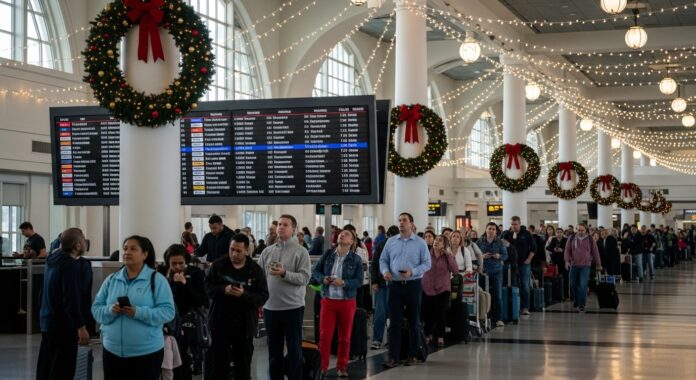The upcoming holiday travel season is always a busy time in the skies. But this year, it comes with an added complication: the ongoing federal government shutdown, which has left thousands of air traffic controllers, TSA officers and other essential aviation staff working without pay and in some cases absent from duty. Understanding how this affects your flight preparation, rights and travel experience can help you stay ahead of disruptions.
1. What’s driving the aviation impact?
With the federal government — including agencies such as the FAA and the Transportation Security Administration (TSA) — operating without full funding, many “essential” employees are required to work but aren’t being paid on schedule. According to the FAA, dozens of control towers and facilities have reported shortages of air traffic controllers, and airlines are being asked to reduce flights at high-volume airports.
2. What travellers are seeing already
According to flight-tracking data, thousands of flights have been delayed or cancelled in recent weeks. For example:
- More than 2,700 U.S. flights were cancelled on a single recent Sunday.
- The FAA has instructed airlines to cut operations by 4% initially and ramp toward 10% or more at 40 major airports if the shutdown persists.
- Average delays at some airports have climbed to an hour or more.
3. What this means for holiday travel
The holiday stretch — from late November through December — is one of the busiest travel periods of the year. With staffing stress in the aviation system, you may see:
- Longer security lines at TSA checkpoints.
- More frequent delays or cancellations, especially at busy hubs.
- Tighter re-booking options, fewer alternate flights available.
- Increased risk of missing connections.
- Heightened anxiety and potential disruptions if you have time-sensitive travel such as family gatherings or flights into/out of Florida.
4. Is flying still safe?
Yes — aviation regulators and industry experts stress that safety standards remain in place despite the shutdown. The FAA says air traffic controllers still working are “essential” and safety oversight continues. That said, with fewer controllers and support personnel available, operational delays and bottlenecks are increasing.
5. How to prepare before you book
Here are practical steps travelers can take to minimize disruption:
- Book flights with flexible terms. Choose tickets that allow free changes or refunds.
- Avoid peak travel days when possible. If you fly either just before or just after major holidays, you may avoid some of the gate-crowd stress.
- Monitor travel alerts. Use airline apps, sign up for flight status alerts, and check sites like FlightAware for real-time delays.
- Arrive at the airport early. Expect potentially longer TSA lines and slower check-in.
- Have a backup plan. Know alternate flights, consider travel insurance or flexible accommodations in case of delay or cancellation.
6. What to expect at the airport
Several changes may affect your airport experience:
- TSA may operate with fewer staff, meaning longer processing times for check-in and security.
- Flight delays may cascade: if the controller staff is thin, a delay in one region can ripple across routes.
- Gate announcements may change more often; aircraft may swapped or cancelled with less notice.
- Some airlines may proactively cancel flights ahead of major delays to avoid further disruption.
7. Rights, refunds and what to do if your flight is cancelled
If your flight is cancelled you generally have the right to:
- A full refund (even if it’s a domestic flight). The airline must offer this when a cancellation is their fault or due to operational issues.
- The ability to re-book a new flight or get credit toward future travel.
Keep in mind: if the disruption is due to a government-mandated reduction (such as a shutdown order) some airlines may classify it differently, and you’ll want to review their terms. Travel insurance (or your credit card travel protections) may cover incidental costs like hotel stays or meals if you are stuck overnight.
8. Special considerations for Florida travellers
If you are flying into or from Florida, here are a few local factors:
- Florida airports handle heavy domestic holiday traffic; when major hubs elsewhere are affected, inbound flights to Florida can get caught in delays or missed connections.
- Weather in Florida during holiday season (including hurricanes, tropical systems or heavy rain) may compound airline or control-tower staffing issues.
- Fly-in regional airports (e.g., Tampa, Orlando, Miami) may offer fewer backup options if a flight is cancelled. Consider connecting via larger hub if possible.
9. What if the shutdown drags on?
The longer the government shutdown continues, the deeper the ripple effects become. The FAA has warned that flight reductions could reach 20% at major airports if staffing shortages persist. That could lead to fewer seats, higher fares, longer delays, and significant disruption for holiday travellers.
10. Final checklist for holiday flyers
Before you head to the airport, check off these items:
- Confirm your flight status and gate 24-48 hours ahead.
- Subscribe to your airline’s alerts and FlightAware (or other) tracking.
- Pack a carry-on with essentials like chargers, medications, change of clothes in case of delay.
- Review your travel or credit-card insurance terms.
- Build extra buffer time into your schedule in case of surprise delays.
With good preparation and realistic expectations, you can navigate this holiday travel season with more confidence – even amid the uncertainty of a government shutdown.
Frequently Asked Questions
1. Will my flight be cancelled just because of the government shutdown?
Not necessarily. Flights are still operating, but airlines and the FAA are facing staffing issues which may lead to scheduled cuts or cancellations — especially at busy airports.
2. Are flights safe to fly during a government shutdown?
Yes. Although some delays occur, safety standards at the FAA remain in place and the agency says essential air traffic control operations continue.
3. Can I get a refund if my flight is cancelled due to shutdown-related problems?
Yes. If your flight is cancelled by the airline, you are typically entitled to a full refund. You may also be eligible for re‐booking or credit for future travel.
4. How long should I arrive before my flight during the shutdown?
It’s wise to arrive at least 2 hours ahead for domestic travel and 3 hours for international. Add extra buffer for security and check-in delays.
5. What happens if my connecting flight is cancelled and I miss the connection?
Your airline should re-route you on the next available flight at no extra cost. But in a shutdown scenario with fewer available flights, there may be longer waits or fewer options — contact the airline sooner rather than later.
6. Does the shutdown affect international flights as well?
Yes. While domestic air traffic is most impacted, international flights can also be delayed or cancelled due to reduced staff for departures, arrivals or clearance operations.
7. Should I buy travel insurance because of the shutdown?
It’s a good idea. Travel insurance (or credit-card travel protection) may cover trip interruption, hotel stays or other costs if your travel is delayed significantly or cancelled. Review policy terms carefully.
8. Are smaller regional airports less affected than big hubs?
Not necessarily. Big hubs may have more flights and greater flexibility, but they’re also under more strain. Regional airports may experience fewer disruptions but often have limited alternate flight options if you’re re-booked.
9. Will the shutdown affect TSA security screening times?
Yes, possibly. With fewer TSA staff reporting, security lines may be longer, and processing may be slower than usual.
10. How can Florida travellers protect themselves during this travel season?
Follow these tips: use flexible tickets, monitor flights closely, arrive extra early, pack for potential delay, and explore alternate airports if necessary. Florida travellers should also consider seasonal weather risks and narrower backup routing options.
If you are looking for dependable homeowners insurance, give GreatFlorida Insurance a call today.



